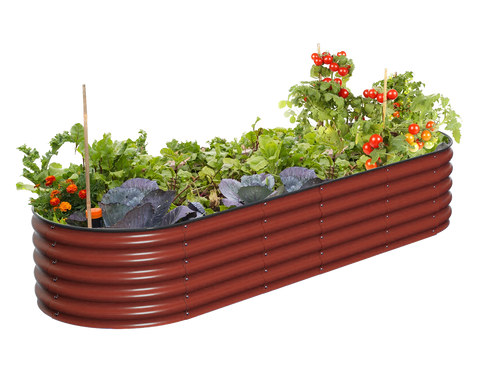Winter Harvest Wonderland: Planting and Growing in Your Raised Garden Bed in December
As winter blankets the world in a frosty embrace, many gardeners might assume that the growing season has come to a close. However, with the right planning and a touch of creativity, your raised garden bed can continue to flourish even in the chilly days of December. In this article, we'll explore the possibilities of a winter harvest and discuss what you can plant and grow in your raised garden bed to make the most of the season.
Cold-Hardy Greens:
December is an excellent time to sow cold-hardy greens such as kale, spinach, and Swiss chard. These leafy greens thrive in cooler temperatures and can add a burst of nutrition to your winter meals.
Root Vegetables:
Root vegetables like carrots, radishes, and turnips are well-suited for winter growth. The cold weather enhances the sweetness of these crops, making them a delightful addition to your winter harvest.
Winter Herbs:
Herbs like parsley, cilantro, and chives can endure the winter months and provide fresh flavors for your culinary creations. Consider planting them in your raised garden bed for easy access to these aromatic additions.
Garlic and Onions:
December is the perfect time to plant garlic and onions, allowing them to establish roots before the ground freezes completely. These savory bulbs can add depth and flavor to your dishes once harvested.
Cover Crops:
To protect and enrich your soil during the winter, consider planting cover crops such as winter rye or clover. These plants add organic materials to the soil, inhibit weed growth, and stop erosion.
Preparation and Maintenance Tips:
Mulching:
Apply a layer of mulch over your raised bed to insulate the soil and protect your crops from harsh winter weather. Mulching also aids in controlling the moisture and temperature of the soil.
Cold Frames or Row Covers:
For added protection against frost, consider using cold frames or row covers. These structures create a microclimate that shields your plants from extreme temperatures, allowing them to thrive in the colder months.
Watering:
Although the growth rate of plants slows down in winter, they still need consistent moisture. Be mindful of watering, especially during dry spells, to ensure the well-being of your winter crops.
Conclusion:
Embracing the winter harvest in your raised garden bed can be a rewarding experience. By carefully selecting cold-tolerant crops, implementing protective measures, and maintaining proper care, you can extend your gardening season and enjoy fresh, homegrown produce throughout the winter months. So, bundle up, grab your gardening gloves, and let your raised garden bed continue to thrive in the enchanting beauty of a winter wonderland.


